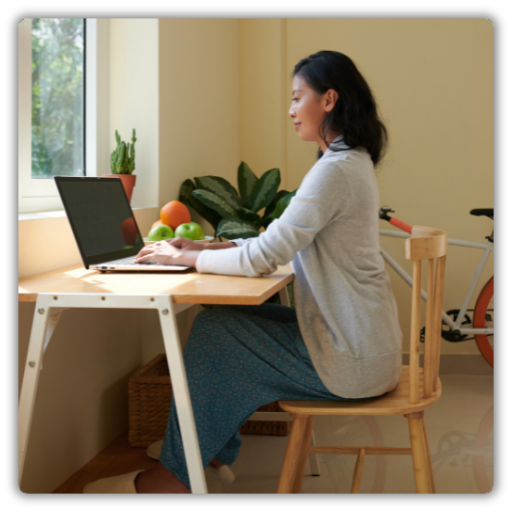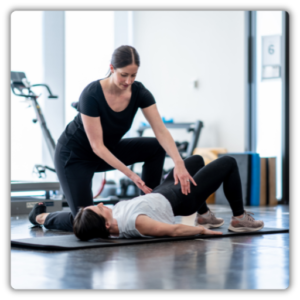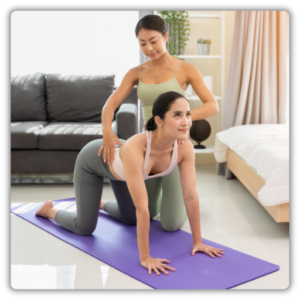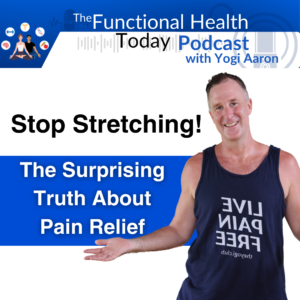
Did You Enjoy This Podcast?
Curious about how personalized physical therapy can change your life? Join Stephanie Telibasa, a physical therapist who prioritizes intimate, one-on-one care to address chronic pain and maintain an active lifestyle. Discover practical ways to enhance your well-being and explore innovative approaches to treating stress-induced discomfort.
Why Posture Matters

In today’s world, we all find ourselves glued to screens, be it for work or leisure. This reliance on technology is breeding a condition known as tech neck, prevalent among both adults and teens. This repetitive forward and down position of the head places excess stress on the spine, leading to neck pain, muscle strain, and potential long-term issues. Alarmingly, almost 80% of people experience back pain at some point, often due to poor posture.
Poor posture can also weaken core muscles, affecting your spine’s natural curves and leading to low back pain. Sitting for long periods or standing or sitting in improper positions can result in muscle fatigue and aches and pains throughout your body. Good posture is important because it helps keep your body aligned and positioned properly, reducing discomfort.
Good Habits for Better Posture
Changing positions frequently can drastically reduce the discomfort associated with poor posture. The Pomodoro technique, which involves working for a set time and then taking short movement breaks, is highly recommended. The real takeaway isn’t about holding a correct posture rigidly but about embracing variety and tools to aid alignment and positioning. For instance, using a cushion or a yoga block under your desk can relieve pressure on your lower back, supporting your body weight and reducing stiffness.
To improve your posture, try tightening your abdominal muscles while sitting or standing, ensuring your body is aligned. Pulling your shoulders back slightly and keeping them relaxed helps maintain better posture. Posture doesn’t have to be perfect all the time, but staying mindful of your posture throughout the day can make a big difference.

Pop in your email below, and we’ll zip it straight to your inbox so you never lose it!
Adapt Your Environment
 Adjusting your workstation at home or in the office can significantly impact posture throughout the day. Ergonomic desks and chairs, along with simple tools like pillow props, help position your body correctly. Sitting in the back of the chair with your feet flat and parallel to the floor encourages proper posture. Sitting at a computer for long periods of time without adjusting can cause muscle imbalances and strain on the upper back.
Adjusting your workstation at home or in the office can significantly impact posture throughout the day. Ergonomic desks and chairs, along with simple tools like pillow props, help position your body correctly. Sitting in the back of the chair with your feet flat and parallel to the floor encourages proper posture. Sitting at a computer for long periods of time without adjusting can cause muscle imbalances and strain on the upper back.
If you’re sitting in front of a computer for hours, ensure your screen is at eye level to reduce strain. When bending over to pick something up, engage your abdominal muscles and avoid excessive slouching. Sitting or lying with proper support can also prevent misalignment.
Maintaining Flexibility and Strength
Physical therapists emphasize that maintaining spine health involves both flexibility and strength training. Examples of activities that promote good posture include yoga, Pilates, and classes that focus on body awareness. If you sit all day, focus on exercises that open up your hips and spine. Conversely, if you stand for extended periods, engage in movements that help balance the strain.
Posture may change over time, but regular movement and exercises to strengthen your muscles can help. Support your lower back by engaging your core muscles and ensuring your abdominal muscles are activated when lifting or moving. This not only reduces strain but also encourages better breathing and overall health as well.
With these adaptations, improve my posture becomes an achievable goal. Good posture can help not only with comfort but also with confidence—the way you hold your body can even make you feel more confident. The effects of bad posture are reversible with consistent effort, and ways to improve your posture are easily accessible with expert guidance.
Did You Enjoy This Podcast?
Curious about how personalized physical therapy can change your life? Join Stephanie Telibasa, a physical therapist who prioritizes intimate, one-on-one care to address chronic pain and maintain an active lifestyle. Discover practical ways to enhance your well-being and explore innovative approaches to treating stress-induced discomfort.














